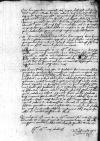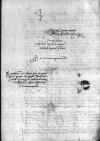Letter #566
Ioannes DANTISCUS to Piotr TOMICKIAugsburg, 1530-11-29
Manuscript sources:
Auxiliary sources:
Prints:
| ||||||||||||
Text & apparatus & commentary Plain text Text & commentary Text & apparatus Excerpts concerning Dantiscus' travels
 BNW, BOZ, 2053, TG 12, No. 1384, f. 75v
BNW, BOZ, 2053, TG 12, No. 1384, f. 75v
Reverendissimo in Christo Patri et Domino,
 BNW, BOZ, 2053, TG 12, No. 1384, f. 74r
BNW, BOZ, 2053, TG 12, No. 1384, f. 74r
Reverendissime in Christo Pater et Domine, Domine Gratiosissime. Debitam et humilem obsequiorum meorum commendationem.
cf.
Et ne in querelis meis recensendis sim longior, compendium illarum est, quod hucusque non desunt nisi tres menses ad septem annos completos, quo exivi  BNW, BOZ, 2053, TG 12, No. 1384, f. 74v quo me clementer redire permittant, ne totus inteream, praesertim cum nihil sit amplius, quod hic illarum maiestatum nomine agere debeam.
BNW, BOZ, 2053, TG 12, No. 1384, f. 74v quo me clementer redire permittant, ne totus inteream, praesertim cum nihil sit amplius, quod hic illarum maiestatum nomine agere debeam.
Neque etiam ulterius subsistere possum, si me ad immorandum diutius cogere voluerint, deficiente nervo, maiorem enim partem proventuum
Qua de re Dominationem Vestram Reverendissimam rogo summopere, dignetur me cum primis certiorem reddere, quid serenissima
 BNW, BOZ, 2053, TG 12, No. 1384, f. 75r
BNW, BOZ, 2053, TG 12, No. 1384, f. 75r
Quae hic aguntur, copiose maiestati regiae descripsi; ad ea me refero. Mitto tamen hic cf. Pro religione Christiana res gestae in comitiis Augustae Vindelicorum habitis. Anno Domini M.D. XXX., [Augsburg?], 1530 , probably⌊acta in his comitiis de religionecf. Pro religione Christiana res gestae in comitiis Augustae Vindelicorum habitis. Anno Domini M.D. XXX., [Augsburg?], 1530 , probably⌋, typis excussa, ex quibus fere omnium hic rerum gestarum cum Lutheranis seriem intelliget. Adiunxi etiam cf. Joannes Leo Placentius, Pugna porcorum, 1530 ⌊poema quoddam porcinumcf. Joannes Leo Placentius, Pugna porcorum, 1530 ⌋, reverendissimo domino Plocensi meo nomine dandum, quo nihil umquam legi mirabilius: omnes in eo versus et praeterea quaelibet dictio in versibus a “p” littera incipit; laboriosum opus et otiosi ingenii ridiculum poema.
Dominum
Scripseram in novissimis Dominationi Vestrae Reverendissimae de taxa 700 ducatorum super episcopatu meo, atqui Varmiensis 400 dumtaxat solvat, rogans ad Urbem a maiestate regia commendaticias, si quid de huiusmodi 700 ducatis adhuc possit adimi seu retineri; ut igitur ad eum modum litterae cum primis ad me cum earundem exemplis mittantur, iterum atque iterum rogo. De bonis ecclesiae meae per dominum palatinum Pomeraniae ablatis, praesertim pulveribus, machinis, armis et equis ex castro Lubaviensi cum aliis multis bonis in auro, argento, vestibus et rebus ecclesiasticis abductis, scripsi iam aliquoties; nihil hucusque impetravi. Cumque iuxta ecclesiarum episcopalium in Prussia morem, in quo et praedecessor meus, frater ipsius palatini, fuit conservatus, omnia successori debentur, miror maiestatem regiam istiusmodi spolium ecclesiae, quam maiestas eius confert, aequiore ferre animo spoliatoremque impune permittere potiri inique ablatis; qua de causa iterum atque iterum Dominationem Vestram Reverendissimam rogo, agat Sua apud maiestatem regiam intercessione, ut vel in sequestrum ablata ponantur aut restituantur, unde sunt sublata, neque sinat mihi absenti in servitio maiestatis regiae sic nulla cum ratione et frivole illudi.
Quod reliquum est, me Dominationi Vestrae Reverendissimae una cum fratre meo summopere commendo et impense rogo, de revocatione mea et de omnibus me quam primum certiorem reddat.
Dat(ae) or Dat(um)⌈Dat(ae)Dat(ae) or Dat(um)⌉
Reverendissimae Dominationis Vestrae deditissimus



